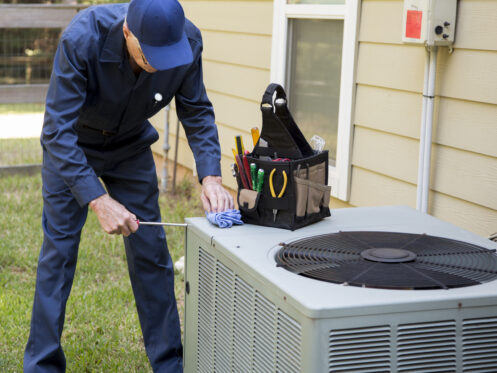Whether you’re moving into a newly constructed home or you’re considering upgrading your existing HVAC system, it’s important to understand the options that are available to you. Traditionally, homeowners invested in a furnace to heat their home throughout the winter months and a centralized air conditioning system to help keep it cool throughout the summer months. However, new heat pump technology has arisen that can give you another option to meet your household heating and cooling needs.
How Does a Furnace Work?
Before we really jump into looking at the advantages of each type of system, it’s important to understand how they work. A gas or oil furnace will burn fuel to create heat. This fuel can be natural gas, propane, or heating oil. As your furnace burns its fuel and warms up the air, it is distributed throughout the ducting in your home to heat up all the rooms.
In some cases, homeowners may invest in an electric furnace. This doesn’t burn fuel. Rather, it utilizes an internal heating element that is powered by electricity to create heat. The air that is passed over the heating element is warrmed and distributed throughout your home.
How Does a Heat Pump Work?
Unlike a traditional furnace, a heat pump uses a compression and evaporation loop to transport heat from one location to another. This is the reason that a heat pump can work to both heat and cool your home, depending on what season it is.
The material that makes a heat pump work is refrigerant. This is a specialized substance that works to absorb heat from the air when it becomes pressurized. Throughout the summer months, you can set your heat pump to absorb heat from the air inside of your home. The now pressurized, vapor refrigerant is then pumped to the outdoor condenser unit. At this unit, the refrigerant releases that heat into the outdoor air.
A heat pump can also do the same process in reverse. The refrigerant will absorb heat from the outdoors. It will then be pumped into the inside of your home, and the heat trapped in the refrigerant will be released. This will warm up your home.
Upfront Cost
When you first start comparing heat pumps to traditional furnaces, one of the first things that you’re probably going to look at is the upfront cost. A furnace will be cheaper than investing in a heat pump. However, there is a caveat to this.
Remember that a traditional furnace won’t be able to cool your home. It’s only available to heat your home during the winter months. A heat pump, on the other hand, will be able to adequately heat and cool your home. When you buy a heat pump, you’re essentially purchasing two different systems in one. If you want both heating and cooling throughout the year with a furnace, you’ll also have to invest in a centralized air conditioning system.
It’s important to note that many heat pump systems include a backup furnace for the coldest temperatures when the heat pump is no longer as efficient. This furnace is only used when the heat pump is not heating the home rapidly enough or when there is not enough heat in the air for a pump to transfer.
System Efficiency
Many furnaces have efficiency ratings of about 80 to 90 percent. Gas burning furnaces are often more efficient than electric furnaces. The efficiency of a heat pump is very different since electricity is just used to run a fan and compression pump. In fact, modern heat pumps tend to have an efficiency rating of between 300 and 400 percent. This means that you’re getting much more performance out of every unit of energy your heat pump uses compared to each unit of fuel your furnace burns.
It’s important to note that the outside temperature can play a big role in the overall efficiency of your heat pump during the winter months. As temperatures start to dip below 25 degrees Fahrenheit, your heat pump will start becoming less efficient. This simply means that it’ll consume more energy in order to produce the same amount of heat for your home.
Lifespan
Each furnace and heat pump manufacturer will give an estimated lifespan for every product that they produce. When it comes to heat pumps, most estimated lifespans are around 15 years. With fuel-burning furnaces, this lifespan ranges between 15 and 20 years. It’s crucial to note that these manufacturer estimated lifespans are based on systems where homeowners provide regular maintenance. The more you take care of your heat pump or furnace, the longer it’s going to last for you.
Space
Another aspect that you’ll want to look at when comparing heat pumps to traditional HVAC systems is the amount of space that they take up. Natural gas, propane, and oil furnaces tend to take up a small space, typically in the attic or a utility closet. They do require some minimal venting to the outdoors to expel harmful fumes. Furnaces are connected to hidden ducting that runs throughout the walls and floors of your home. Electric furnaces will have a similar footprint to a gas furnace but does not emit harmful fumes.
On the other hand, a heat pump will have a few different components. The first is an outdoor compressor unit. This will be installed near the exterior of your home and is an essential component for transporting heat. There will be at least one indoor unit, depending on the type of system you use.
An indoor air handler unit is used to distribute conditioned air. If your heat pump is part of ducted central air, the air handler will connect directly to the exposed ducting to help move air throughout all the ducts. Ductless mini-split units with built-in air handlers will be installed on the walls in the main rooms of your home. In general, heat pumps tend to take up more space than a furnace alone.
Maintenance Needs
Both heat pumps and furnaces need to undergo regular maintenance to stay in peak condition. Heat pump maintenance can be a bit more time-consuming for your HVAC technician than your furnace maintenance. For example, refrigerant levels must be checked and condensate drains must be cleaned. Both will still need to have their air filters changed regularly. The outdoor unit for your heat pump will need to be kept clean from outdoor debris, which adds another chore to your to-do list that a furnace doesn’t require.
It’s also important to note that you’ll need to have fuel available for your natural gas, propane, or oil furnace regularly. For many, this includes having an on-site fuel storage tank and getting regular fuel deliveries. With a heat pump or an electric furnace, you never have to worry about ordering or storing fuel.
Rely on the Professionals
Environmental Heating & Air Solutions provides top-quality heat pump installation services. We can also help with all of your heating, cooling, indoor air quality, plumbing, home automation, insulation, and air duct cleaning needs. Contact our friendly staff today to get an appointment for your home.

